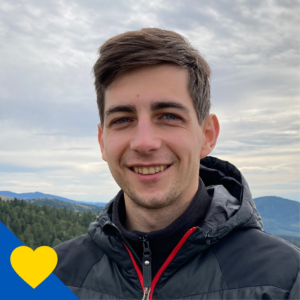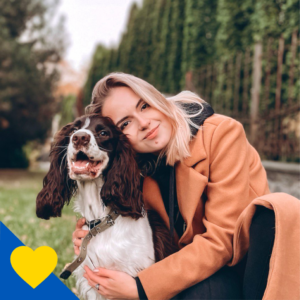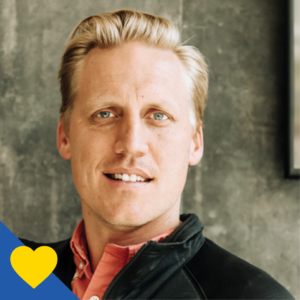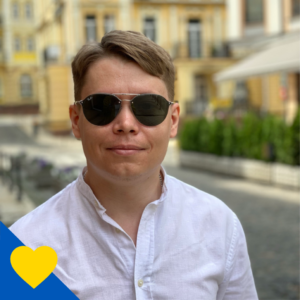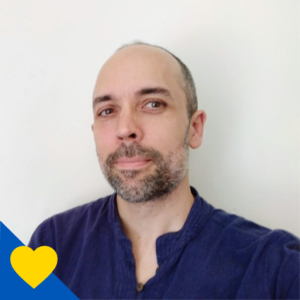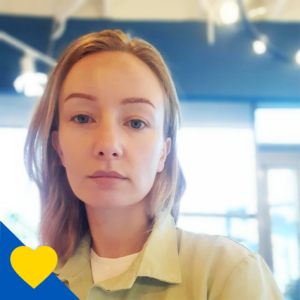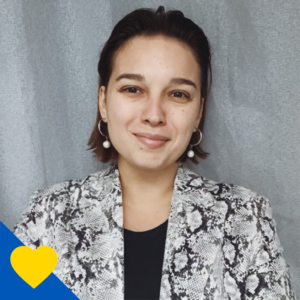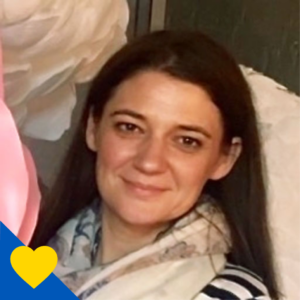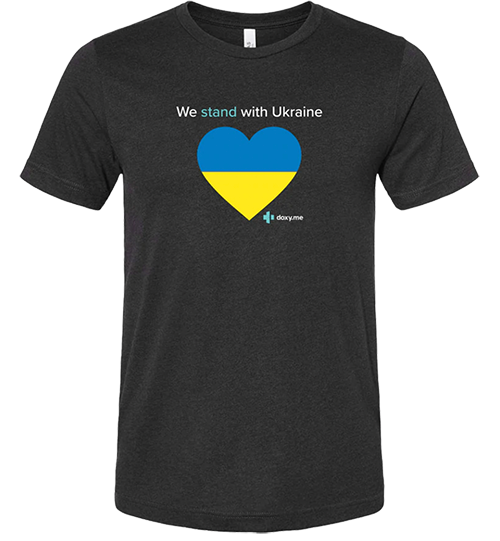
Heroes of Doxy.me: You Only Have Time for What Matters
Kate Semenova lived 20 minutes from the Kyiv airport. She was jolted awake by the bombs that fell on February 24, 2022, and her life was changed forever. With family in tow, she fled to Western Ukraine.
View Episode Transcript
Mary:
Hi, Kate, could you start by telling me where you grew up?
Kate:
I grew up in a key of Ukraine. It’s basically the capital of Ukraine. So I lived there all my life.
Mary:
And you went to university there?
Kate:
Yeah. Yeah. I like university school all my life is there. My, my mom’s house, my, my grandpa grandparent’s house. So everything is there.
Mary:
Can you tell me about what you were experiencing at the beginning of 2022? Your thoughts at the beginning of that year?
Kate:
Honestly, I, I was somehow, maybe foolish enough just saying that it is not real. It, it can happen. It just like how it’s like she’s housing 22. It’s not possible. It would be complete madness by, but I obviously underestimated the how dangerous this situation.
Mary:
Yeah. Where were you the morning of the 24th?
Kate:
I hope we hear 20 kilometers from airport that was bombed. So I woke up at 5:00 AM because of the bomb shots. So it was horrible experience.
Kate:
So you just try to actually tell yourself though, not it’s not what is happening. Try to read news. Try to actually fool yourself was that this is not real, but then like at 6:30 AM my mom called me, my boyfriend parents called me at the same time. And you just realize that this, this is it. It has started, you read the news one and a half hour later and you understand, and that you are in a war. And it just, just so basically it takes me like 20 minutes to drive to, to, to places where it was bothered. So it is it just in front of your house? Basically, my boyfriend said that he’s not leaving and I was not able to leave and evacuate my mom and grandma. So I had to first try to manage that to make sure that my grandma is safe and she can go outside of Kia because she has, she leaves in like 100 miles from Kia.
Kate:
So we had to evacuate her there and we had to make sure that she has all the medicine needed on provisionary because she has a diabetes. And then we have to figure out, I don’t know, behind by food and actually make sure that we can live in Kia for, I don’t know how many days, but I went out and every single was closed. Like all the gas stations were they’re overcrowded. People were running out of the city and ready. Everything was, the traffic was extreme. People were just throwing their stuff in the cars and trying to be like, you are not like, basically there is no ability to buy food or medicine or withdraw cash because everyone was so scared that the banking system will fall. So yeah, it was like, it was quite scary. So we try to actually understand what are the food supplies, just to what will happen if we will not, we’re not going to have water or like, just, just to do that kind of stuff to, to collect all, all the necessary clothes, just a minimum amount money, and nor the possession, valuable possession, just in case you have to run in the bum shoulder or this kind of stuff.
Kate:
So it was a bit scary. And then I understood that if my boyfriend is saying in Kia, I just started cooking to make that weekend survived through through his day. And I just, the police I’m useless at some point, I understood that I am quite useless. I’m not able to defend or do at this particular moment. So I just try to make sure that we’re not hungry. And it just gave me some meeting of the day. Yeah. But then there was a first air alarm in Kia. My mom came to my house because there was super scary because we didn’t know at that moment how to react. And so we gathered in my apartment because there is a bomb shelter underneath and we spend the night basically was the time shifts for two hours of sleep and then rotating because it was so scary to sleep somewhere in the middle of the night. I don’t know, around 4:00 AM.
Kate:
And I don’t know whether it was an aircraft or it was a drone. It is most likelihood. It was a drone was hit by Ukrainian army, just in front of my house. There was, yeah. And I’m standing in front of the window and I’m just seeing it with my own eyes. I wouldn’t, I wouldn’t be able to forget all this. It is extremely scary experience because you don’t know like, okay, what? It’s like 500 meters or one kilometers from you probably. But you just don’t know when and where the next one, whether at that moment you don’t realize whether it’s a drone or something. You just see the, the explosion, you don’t know what is happening then after I read in the news, what, what wasn’t, but, but still, this is super scary. So in the morning we decided to leave here immediately.
Mary:
You and your mother.
Kate:
And we did
Kate:
Like it. Yeah. At 7:00 AM. We just packed some few pews, like fewer things in our car and just run away to Western part of Ukraine. Lucky enough, we are actually extremely lucky because the, we were able to escape the soonest. It was legally we could, because there was a, I don’t know how to say it in English. So cave administration, defined hours when you cannot leave your home. So as soon as we were allowed to leave our curfew, yes. As soon as we were allowed to leave our houses. So we, we went and the, there was no car. So at that moment, and we drove to the Western part of Ukraine and my boyfriend has parents here. So now I’m living with them for 50 days of four. So, so
Mary:
Town are you in now? Is it Levine or Western part? I heard, but
Kate:
It’s, <inaudible>, it’s like eight miles from Polish border. And
Mary:
How have you decided to stay in Ukraine rather than cross the border?
Kate:
Hm. Males are not allowed to leave the border, so I’m not leaving my boyfriend here alone. I just that’s.
Mary:
Yeah.
Kate:
That is unbearable. You, you just can’t live with living someone behind you
Mary:
And tell me what your days have been like the last 50 days.
Kate:
Hmm. Oh, pretty much the same.
Mary:
Yeah.
Kate:
Oh no. Like first few weeks air alarms. And they’re quite loud, like in the middle of the night, like two, three lights on the, when you run back and forth, living with a lot of people in the same apartment, because not knowing what, what, who come tomorrow and how much worse it can get, not knowing what are you going to do in your future? Or do you still have your house? You still have your home. How are your friends? And all of that? I think from it started from that. And then it slowly, we were able to, to adjust some living in this circumstances and yes, life is difficult. Yes. Everything. We, we may lose everything, but at least the people we cared the most are here. Everyone is alive and it is good. And I’m grateful for it. The most important staying in life are, are okay. So people that I love and, and, and then you learn how to manage all those, like living oldest, living how to organize food when it’s like nine people in the apartment when to organize how to organize working space, how to, to, or in ICU or sleep on and so forth.
Mary:
Does it almost help to have something concrete
Kate:
To solve
Mary:
Like food or sleeping arrangements to help somehow?
Kate:
Yeah. Yeah. It helps. So I, I knew because of what I do, like those tiny little plans, they help you to cope in the sense of little achievements that you actually did something today rather than constantly running around and the chaotic when moving. So I knew that. So we’ve built a plan and who is doing what in the house and who is working where an Elvis kind of arrangement. And so I knew, and we started to create a structure, some sort of structure to order to give her some sense of ground and sense of
Mary:
Safe space.
Kate:
I would say safe space.
Mary:
So Kate, have you continued to work during this time?
Kate:
Yes. I think I came back to work four days later. So it was Thursday. It started. And on Monday we were, we cut back to work to some degree, of course, in, because I am the one who is able to support people, especially a doxyme because a lot of people had to escape and we were thrown away all over the country. So nobody knew what to do and how to live. And it was all so stressful to everyone. My story is actually super white. I believe. I don’t know how people with children, escape people who were actually way closer to, to Bombay and who actually saw the diff like, like there are some people who saw the way worse. So I’m lucky I have where to leave what to eat and I’m in a relatively safe place. So, and so I started doing like every morning, a meeting group where everyone could participate, like shares a story, actually see charger had a connection, actually sees this madness. It’s that those people are not the only ones who feel this way. Like all those stress that everyone is stressed and it’s okay to be stressed. And it’s okay to feel what you feel.
Kate:
I actually showed people how to cope with it, but it’s, we lost sense of ground, but you’re still people. You’re still human beings and you are still, you can still be yourself and you still have your own strengths and yes, it is incredibly stressful, but you still come back and to your life and you still have, you, you still can have some houses, so you still can have.
Mary:
So Kate, where do you think that stress,
Kate:
What we were,
Mary:
Did you already know you had those resources
Kate:
I’ve been studying as a existential coach for, I don’t know, a four to two and a half years. I believe so. Somehow I realized in the morning that I know what to do and I have to, and if I could help, I showed. So I also knew that doing something good and seeing people how, how old is like that, I can actually help actually brought a meaning to my life and actually gave me energy and desire to move on because I realized like a lot of people don’t have a choice to live or not to because their w their life was taking and there, and I have to live mine to live, to fully live my life to otherwise your sacrifice was meaningful Or meaningful.
Mary:
So tell me more about these groups. Are they on zoom?
Kate:
So,
Mary:
And how many people attend the groups?
Kate:
Yeah, we had online, we did those groups for more than a months. Right now. We stopped them because it seemed that everyone is most okay. Yeah. For, for half an hour, everyone, it’s, it depended on the day. It like from 30 people to five and interrupts, jumped up and down.
Mary:
I’m glad you could do that. Has your boyfriend been able to, has your boyfriend
Kate:
To
Mary:
Continue working?
Kate:
Yeah, he’s a software engineer and I think he, to some degree he’s coping, maybe even more than I do better. I mean, better than I do. He is able to actually create his own child and hide from, from the world. I cannot do that. I, how to emphasize and synthesize. So sometimes it just too much for me because I, a lot of emotions go, go through me, but I’m learning also how to, to, to take care of, for myself as well, not to overwhelm myself was all the, all the sadness, all the grief. So people are feeling because otherwise, if I will break myself, I will not, not be able to help.
Mary:
I don’t know the word of course, but I, I think you’re talking about being an empath, someone who absorbs, understands and takes on emotion. And I think even under normal circumstances, that can be exhausting. Right. But now it’s especially, so
Kate:
Yes.
Mary:
Tell me how your mother’s doing.
Kate:
I, oh, it’s physically. Okay. Mentally. I think it’s hard to live in someone else’s house, not having your own and basically not belonging to I have my work, but I think half of her work dropped. So she is quite less busy. She’s trying to, to help me to cook, to do some, some staying in house in the house, but it’s still difficult for her. Of course, like as young people, we are much more adoptive to this changes. We can just put our laptop, throw it on the couch and then work. But for older people, it did is much more stressful. Plus I have my boyfriend, there is his sister and her boyfriend here. We have, we, we still have someone with whom we’re able to communicate. She has less connection. So, and sometimes, you know, it is easier for, for children to, to emphasize everyone else except their parents. So it’s, and especially living I’m in my thirties, basically, and living with parents is, is a challenge. So I think she’s also feeling those challenges, even with her joke with children, like a mom is always a mom, so,
Mary:
So much to carry, right?
Kate:
Yeah. I am dreaming for the day when nothing will happen. And that’s it. Then that would be a very, very high,
Mary:
This whole experience shaped your view of humanity.
Kate:
I think it’s a very, very difficult question, to be honest. First of all, I am surprised that there is so much care, love, and, and help, and on the other side, anger and desire to kill. So I don’t know what to say. Like when you’re asking me this question, I don’t think about humanity. I think I I’m much more basic questions right now than this. That is I’m, I’m basically, I might have worse.
Mary:
What strikes me about this crisis is exactly what you said. It highlights the very best and the very worst. And you are at the crossroads of those two extremes. And I think holding them at the same time is probably almost unbearable.
Kate:
The ones I, it is. But on the other side, it is gives you some freedom. On the one side, it does, it is very, very difficult and it’s very stressful. But on the other side, it gives you a lot of freedom because you don’t have time for, for wasting your life. You don’t have time for actually doing things that You have only time for what matters and everything else is a waste. And we’re is actually opening eyes to many peoples around me. Like I was so afraid to do that, but no, I’m not. I was S so I just don’t have time for this. So it, it, it gives me a lot of freedom. It actually, a lot of, of fears my own to ask for help, to, to do some same, to, to live in a different way. I’m not afraid anymore, because finally, you actually understand that you only live once and you don’t know when it will end. Maybe tomorrow.
Mary:
I was like, this, this experience has been so Illuminating and clarifying and defining for you.
Kate:
Yeah. And I think even for organizations, you don’t have time to actually, to, to, to, to deal with, I don’t know, unprofessional edge and more in some cases, or you don’t have time to, to, to, to, to deal with some things that are not fix. It doesn’t matter that are not important. You, you are able to actually focus on the main things and actually do something, because there is a very strong sense. There is a strong sense to, and some desire to have an achievements And a desire to focus in order to, you know, to come down from all of this stress. So, So I, I think I would prefer to learn this lessons in other way, but That valuable lessons,
Mary:
Imagine your future. What do you see yourself? How do you see yourself using these insights in your future?
Kate:
First of all, there’s always will be too many things that I will like, but only few that I actually care about. So I have to learn how to focus and, and spend my time and life only on things that matters actually matters. Life is too short to be afraid of something and all those houses, apartments and all that stuff. It doesn’t matter. As long as I actually have a meaningful and full life, I want to, in the end of my life, I want to hold to something that I would remember and it’s worth remembering because only memories that actually mattered. You can always be yourself in different circumstances, being a human and to live a life is a choice hard one, But you can always make it. And probably his last one strong enough. So to remind myself that I’m strong enough to do
Mary:
You think back to your response, the morning of February 24th, you were a very different person now in terms of your confidence and strength, just the way you described that experience.
Kate:
Yeah, because it,
Mary:
Yeah,
Kate:
It hits you, you lose us the ground, but it takes, you takes you some time to actually to restore your ability to be yourself. Because for the first two weeks, I felt like I was, I was thinking I’m not myself. So as soon as you’re able to connect with your email’s health and remind yourself who you are, like, then you’re able to actually to push back into fight.
Mary:
Kate, could you just briefly describe your training as an existential coach? That’s a term I have never heard of.
Kate:
So very close to existential therapy therapy, or a log of therapy. It’s very popular in, in Europe. So it’s basically came out of Franco and language. So there are main creators of this, how to say therapy learning. I don’t have the word. Yeah. So as a part of a therapy was created a coaching it’s so, so it’s quite deep, but still not yet therapy to be able to, to was, Was assigned phenomenon as a therapy, but a bit more on a higher level and sometimes on like, and also an organizational level as well
Mary:
As at doxyme,
Kate:
Because
Kate:
Yeah, because you like work is still a part of life. You have to have your own sense of ground sense of space and sense of security at work. And in life, you need to have a, a sense of living. So those, you need to know who you are. Yeah. And in order to actually be able to create a sense, like every single person needs that. And as well as organization, they need to have enough structure, enough space. They need to be alive enough to be able to enjoy themselves and enjoy what they’re doing. They need to clearly understand what this organization is doing and why it is exists in order to bring their own sense into the world.
Mary:
So what, what, could you please describe your job for doxyme?
Kate:
Yeah, it is. I am working as a head of a general practice and scrum master a doxyme. So I am helping this organization to be more efficient and actually to be more agile and to be more adoptive, to changes, to help them meet the changing world and to be able to adopt to exchanges and to be successful.
Mary:
Perfect match for your
Kate:
Skills in order to, yeah. Yeah. I love my job and I am extremely happy that I can actually do this job here, That I have a room and people who actually understand this at doxyme.
Mary:
Did you have any closing thoughts before we end?
Kate:
Yeah. To, to live it is a choice and not an easy one. We should live.







